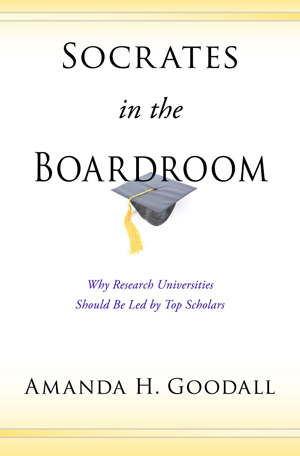
Socrates in the Boardroom argues that it is experts, not managers that make the better leaders. This is a message that, recently, has been almost unfashionable. I go a step further: using quantitative and qualitative data, I show that in universities it is the best of the experts and scientists who make the best leaders.
I use the example of university leadership to try to communicate that managers have been given too much power—not just in organizations such as universities and hospitals, also in the corporate sector. Specialists, experts and scientists should lead our institutions if we want to boost our economies through innovation and entrepreneurship, and solve problems like climate change.
In the last half of the 20th century the importance of management training became recognized. As society moved away from predominantly family-owned businesses and employment through entitlement to a more meritocratic and efficient approach to enterprise, good management was crucial. Business schools took off, as did the MBA degree.
But this move has gone too far. At present, managerialism feels preeminent—as if expertise is not important. Could the banking crisis have been somewhat averted if bank CEOs were great technical experts instead of good managers? They might have better understood what was going on in the belly of their organizations if they were banking specialists, but many were not.
My main message is that leaders should be experts in the core business of the organization they are to lead. This is not to say that management is unimportant. Of course it is. But I believe we need to get back to basics. There has been a trend for CEOs to float around different sectors—as if a head’s success when in charge of a retail business automatically means that the same individual can lead a manufacturing company. I find that a hospital should be lead by a doctor and an automobile company should be led by someone who knows the industry and the technology intimately. This might indeed mean that the CEOs who are accountants and marketing specialists return to their fields of expertise—accounting and marketing.
Though the main focus of my book lies with the research universities, I also look at other sectors. In chapter 7, for example, I look at professional service firms such as law, management consulting and architecture practices, as well as at arts and sports. Here, including evidence from a co-authored paper, I show that teams perform substantially better in the NBA if they are led by a coach who was, in his day, an outstanding player.
“the best universities in the world are overwhelmingly led by outstanding scholars.”
There are literally thousands of books on leadership on the market. And one of the common criticisms about them is that they are often anecdotal and lack convincing evidence.
Also, various disciplines have researched leadership. Historians tend to focus on the “great man” perspective. What can we learn from the actions of Winston Churchill or Abraham Lincoln? These accounts make interesting stories but they are not generalisable. Psychologists have tended to focus on individual characteristics such as traits, and sociologists have stepped back into the wider context; in my view, the former get too close, and the latter too far. Critical management authors believe that leadership is elitist so they ignore it. MBA students, on the other hand, often look to the “charismatic leader” for solutions. The head of a US business school told me that all MBA students want Jack Welch to be dean.
Arguably, the success of a leader will be due to many immeasurable factors. And unlike in the experimental sciences, we social scientists cannot randomly assign a CEO to an organization. But despite the cloudy conditions, I believe it is essential that empirical researchers try to establish the effectiveness of heads. Leaders have the most power in organizations, and substantial resources are invested in their recruitment and pay.
The approach that I adopt to this topic is partially drawn from economics, and I also include interview evidence. So the book includes lots of data, both quantitative and qualitative, but it has been written to be accessible.
The statistical analyses demonstrate two main findings. First, that the best universities in the world are overwhelmingly led by outstanding scholars. Second, that if a top scholar comes to preside over a research institution, the performance of the university will improve some years later. To get to the issue of causality I use time lags—I look at the leader some years before I look at university performance. I also have some control variables (in other words I hold some things constant)—for example the size of a university or the discipline of its president and their age.
It may be helpful to mention the influence of my personal background. I worked in university administration before switching to research. I worked closely with university leaders as part of the top management team. One of the presidents I worked with was Anthony Giddens. Giddens is an outstanding scholar, well known across the social sciences, and I noticed that his behavior and preferences as an administrator were different from those of other presidents I worked with—those who left research early in their careers to become administrators. So the hypothesis I raise in this book—that better scholars make better leaders of research universities—came out of real life.
Why do experts make better leaders?
I interviewed twenty-six presidents and deans in universities in the US and UK, including Amy Gutmann at U Penn, Lawrence Summers and Derek Bok, former Harvard presidents, David Skorton at Cornell, John Hood at Oxford, Patrick Harker at the Wharton School, and others.
Four reasons why top scholars should lead research universities emerged from these interviews.
First, a president who is a distinguished scholar will have a better understanding of the core business of a university, that of research and teaching. This is central to the idea of “expert leadership,” that in organizations where the core business relies on expert knowledge the leader must first be an outstanding expert in the relevant area of business. This challenges the ideas of managerialism that would appear to promote management skills above expert knowledge. Arguably, top scholars, engineers or lawyers must also have management and leadership skills, and in my dataset of 400, almost all the leaders had progressed through managerial hierarchies in their institutions prior to the top job.
A second explanation raised by interviewees, one that again relates to expert knowledge, is that a scholar-leader will likely demand higher academic standards. Arguably, it is leaders who should set the standards in any organization. This message is articulated by a dean in one of my interviews: “leaders are the final arbiters of quality. Therefore it is right to expect the standard bearer to first bear the standard.”
Top scholars send out important signals to a number of audiences. That was the third explanation from interviewees. They signal a university’s priorities, act as a beacon when hiring other outstanding academics, and, it was argued, are attractive to students and donors.
Finally, it was suggested that scholars are more credible leaders. A president who is a researcher will gain greater respect from academic colleagues and appear more legitimate. Legitimacy extends a leader’s power and influence.
So if the board of a research university wants to improve its performance in what I consider is the “core business” of research and teaching, then they should hire great scholars as leaders. And, as discussed in chapter 7, this is also relevant to heads in law and accounting firms, in R&D, management consultancies and architecture practices, and the creative industries.
“If scholars are so bad administrators, why have universities done so well, often against odds like decreasing funds and more than occasional outside interference?”
Universities are among society’s oldest and most respected organizations. If scholars are so bad administrators, why have universities done so well, often against odds like decreasing funds and more than occasional outside interference?
One might think that managerialists have led a sort of conspiracy against experts and specialists. Time and time again whilst undertaking my research I was told that academics do not make good managers or leaders. This opinion, often stated vociferously, came from a number of academics, administrators and those outside universities, including politicians, civil servants and business people. The president of a powerful US university once said it to me, and I have heard it from individuals who have barely stepped foot in a university.
The opinion has reached folklore proportions. When I ask for evidence, academics will often tell anecdotal stories about a former department chair. Among those outside the academy there appears to be a general belief that people clever enough to be academics must lack normal human organizational abilities.
I often respond to these claims by posing a scenario: imagine that 100 nurses and the same number of lawyers, chefs, advertising executives, engineers, journalists and academics are randomly selected. Will we find that one group or profession stands out as natural managers? Is it not more likely that management skills are learned through training and experience? And that, even if leadership may be somewhat different, the propensity to manage is, approximately, evenly distributed across all professions?
Universities could be accused of being poor at training their faculty in management and leadership. In research universities, it is usual for departmental heads to rotate every few years, and it is common for a professor to walk—or be dragged—directly into the job with no prior instruction. But this is a different argument.
So my plea is to bring experts and specialists back into leadership positions in our major public and private institutions.


Amanda Goodall left high school at 16 and worked as a fashion model until the mid 1980s. She then lived in India on a small development project, and for a number of years worked with campaigning organizations back in the UK. At age 33 Amanda went to university—the London School of Economics—and graduated with a first-class honors degree. Following the degree she worked with Anthony Giddens, director of the London School of Economics, as part of the top management team, and later with the president of Warwick University. In 2004 Amanda started a Ph.D. at Warwick Business School which she completed in 2007. She is currently a Leverhulme Fellow located at Warwick Business School in the UK. Recently she has held Visiting Fellowships at Cornell University and the University of Zurich. Her work is available at www.amandagoodall.com.